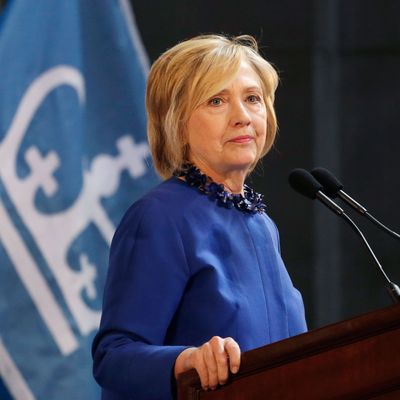
Hillary Clinton spoke at length about the situation in Baltimore in a speech at Columbia University today, saying that every police department in the country should use body cameras and calling for an end to “the era of mass incarceration.”
“We have to come to terms with some hard truths about race and justice in America,” she said in her remarks, which were part of the 18th annual David Dinkins Leadership and Public Policy Forum.
She also said that criminal justice reform must be coupled with providing economic and educational opportunities, tying this issue into the broader economic focus that has so far guided her still-young presidential campaign. “We can’t separate the unrest we see in our streets from the cycle of poverty and despair that hollowed out those neighborhoods,” she said, adding that the situation in Baltimore is something that “does tear at the soul.”
Altogether, the address was a continuation and expansion of things she said after the deaths of Eric Garner and Michael Brown (“Yes, black lives matter,” she said in December), and a signal of how much mainstream thinking on criminal justice has changed in the past few decades.
During Bill Clinton’s presidency, Hillary was largely supportive of his efforts to reduce crime, which had a hand in abetting the era of mass incarceration she mentioned today. In 1994, she said, “We need more police, we need more and tougher prison sentences for repeat offenders. The three strikes and you’re out for violent offenders has to be part of the plan.” By the time she was campaigning for the presidency in 2008 — following a dramatic fall in the crime rate over the previous 15 years — her thinking on these policies was beginning to change. In 2007, she was asked if she regretted the effect her husband’s policies had on marginalized communities. “I think that the results,” she said, “not only at the federal level but at the state level, have been an unacceptable increase in incarceration across the board, and now we have to address that.”
As Jamelle Bouie pointed out earlier this week, this years-long tiptoe away from the ’90s was probably inevitable, given that Clinton probably would like to win next year. “Hillary may have to stand against the policies of her husband’s administration,” Bouie wrote, if she wants to “build Obama-esque enthusiasm among college students, black Americans, Latinos, and educated whites.”
She is not the only person in the upcoming presidential process who thinks that reform is needed, or who would like to win the support of the aforementioned demographics. Senator Rand Paul has spoken out against mandatory minimums and has worked together with Democrats to sponsor criminal justice reform bills. The Koch brothers — who plan to spend nearly a billion dollars this election cycle — have been talking about the “overcriminalization of America.” This week, Koch Industries announced that it will no longer ask prospective employees if they have been convicted of a crime. Senators Marco Rubio and Ted Cruz have also spoken about the need for some sort of criminal justice reform. Last year at CPAC, several panels featured talk of criminal justice reform.
As Clinton put it today: “It is rare to see Democrats and Republicans agree on anything today, but we are beginning to agree on this.” It seems inevitable that campaigns, Congress, and other political figures are destined to talk about this issue with increasingly regularity, even if progress continues to move as slowly as ever. In December, the White House asked Congress to allocate $263 million for the type of body cameras Clinton mentioned today, along with additional training for police departments and other measures intended to address the high-profile law enforcement problems made obvious by deaths in Ferguson, Cleveland, and New York City. “This time will be different because the president of the United States is deeply vested in making it different,” President Obama said at the time.
The money was never allocated. Senators Rand Paul and Cory Booker sponsored legislation to get nonviolent crimes off the records of minors. The bill had to be reintroduced this year, as it never even made it past committee. Obama has changed the process for giving clemency to federal inmates, but has been slow in issuing commutations so far — partly because the number of qualified people submitting applications is overwhelmingly high.
The amount of protests and soul-tearing necessary to expedite the process remain an unknown variable.





























